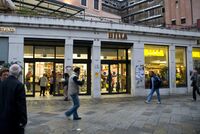Money matters
Here are a few suggestions about money. Keep in mind that these are suggestions, not requirements. In the end, it’s up to you what you decide to do with your money, and how.
Euros and currency exchange
All of Europe now uses the euro (except England). We do not recommend that you exchange all of your dollars into euros before leaving the U.S. Instead, wait until you arrive in Italy. If you are able to secure €25 to €50 before leaving, however, you will be able to expedite your trip into the city upon your arrival, being able to proceed directly to public transportation instead of standing in line at an exchange bureau.
If you plan to arrive late at night, when exchange bureaus may be closed, then it would be wise to leave with some euros in your pocket to pay for the airport shuttle and the first few boat trips. ATM cards (see below) should work at any time of the day or night, provided there is an ATM nearby.
In general, exchange rates are much better in Italy than in the U.S. Depending on the exchange rate, you may prefer to exchange just one or two hundred dollars at a time in Italy, if you think the dollar will become stronger at a later date. This, of course, is a gamble, although the difference is really minimal from one week to the next. Since you get charged a transaction fee for every exchange operation, another strategy is to exchange larger sums, as long as you think the exchange rate is fair at the time. In any case, this applies only to cash or traveler's cheques, which are NOT the most recommended monetary instruments, as described below.
ATM cards
It is highly recommended that you bring an ATM card. As long as your bank belongs to the Cirrus network, you are assured to be able to use your card as the primary means of getting euro cash at the best exchange rates available on any given day (when using the card at a Cirrus-network ATM). If your card does NOT belong to the Cirrus network, it may still work, but its functionality and the fairness of exchange rates are not guaranteed. Of course, you have to remember your PIN number, just like getting cash in the U.S. The use of ATM cards is exactly the same as it would be in the U.S., except the machines spit out euros instead of dollars. Most machines have multilingual displays, too.
When using an ATM, you get euro cash, and the equivalent dollar amount is deducted from your U.S. bank account automatically. Transaction fees will typically apply, so it may be wise to withdraw fairly large amounts once a week, rather than small amounts every day.
Credit cards (VISA or MasterCard)

The second best option to get euro cash is a VISA or MasterCard. In order to use these for cash advances, you MUST have a PIN number, which you probably rarely use in the US (and may never have set up - contact your bank). Make sure you set up and know your PIN before leaving; calling an American bank from Italy is expensive and difficult (due to the time difference). The exchange rate is usually good, although you are, of course, charged a high rate of interest immediately on the cash advance by your U.S. credit card institution. A better way to use your credit card would be at the grocery store, or when making sizable purchases. That way, you can use cash for little things, and charge €50 or €60 to your credit card every once in a while.
Cash
Do not bring too many dollars in cash, although a two or three hundred dollars will be useful to have in your pocket for the trip, for the first days in Italy and also for your return to the U.S. There are too many risks involved with having large sums of cash with you, so keep it to a minimum.
Traveler's Checks
Traveler's checks are being phased out in favor of ATM and credit cards, and are virtually useless (and uncashable) in Venice as of 2009. Do not bring any travelers' checks unless you do not have an ATM or credit card, in which case traveler's checks are probably your best bet for bringing money to Italy. If you have an ATM card, don't bother with traveler's cheques and just bring $200 to $300 in cash for immediate needs during your trips to and from Italy.
Personal Checks
We recommend that you bring one or two personal checks as a backup in case you are in dire straits and need emergency cash. The VPC can accept personal checks on faith and provide euros in case of emergencies.
Wire Transfers
In case of emergencies, money can be transferred from a U.S. bank to the VPC bank account. We can provide details about this as needed.